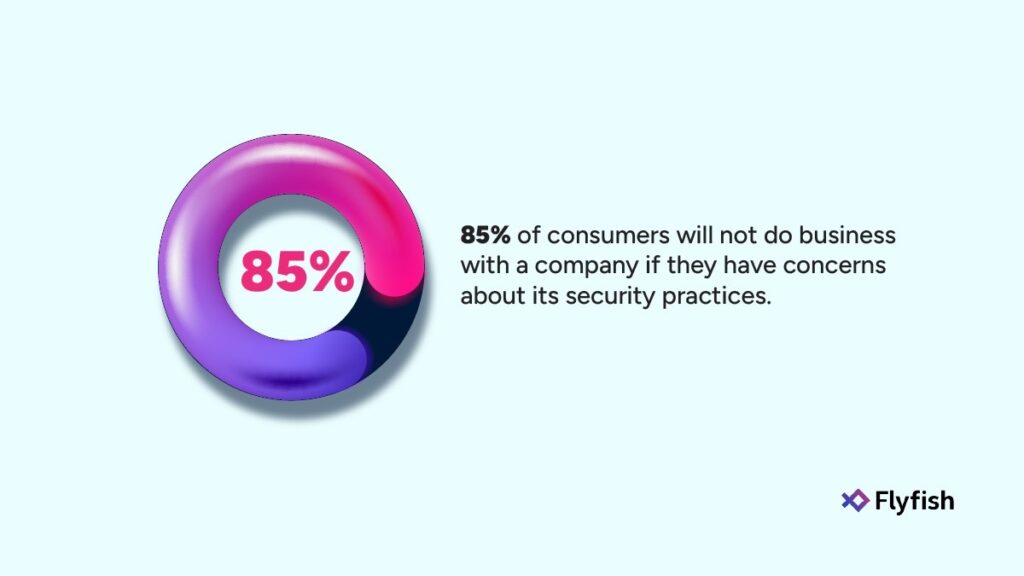
Tired of one-size-fits-all shopping?
80% of us prefer personalized experiences! That’s where Gen AI platforms like Flyfish come in, revolutionizing online shopping so you can find exactly what you want. But with great power comes responsibility, and AI is no different.
Well, responsible AI means building and using AI that’s fair and transparent and holds itself accountable.
Why should we care? We care because trust and ethics are the backbone of any good shopping experience. When businesses focus on ethical AI, they’re not just improving shopping; they’re building lasting relationships with us, the shoppers.
This blog dives into the exciting world of ethical AI in shopping, building trust and strong relationships between you and the brands you love. Let’s explore how AI personalizes your journey and why keeping it ethical is key to a happy shopping experience!
Understanding Responsible AI

When we talk about responsible AI, we’re diving into how generative AI systems are built and run to uphold core ethical values. This isn’t just about avoiding harm; it’s about actively promoting fairness, transparency, accountability, and privacy.
Let’s unpack these a bit:
Fairness
AI must be free from biases that can lead to discrimination. This means algorithms should treat everyone equally, regardless of race, gender, or background. For example, when a loan app uses AI to decide approvals, it should make its decisions based on financial data alone, not biased by personal characteristics.
Transparency
It’s about being open to how AI systems make decisions. Ever been frustrated because a service denied your request, and you couldn’t figure out why? That’s a lack of transparency. AI should be able to show its workings, like a math problem on a test, so users can understand and trust the process.
Accountability
This principle ensures that there’s always a way to hold the system (and the people behind it) responsible for its actions. If an AI system makes a mistake, like overcharging you for a purchase, there should be a straightforward way to correct the issue and prevent it from happening again.
Privacy
AI often works by analyzing large amounts of personal data. It is crucial to keep that data secure and use it ethically. No one wants their shopping habits or financial information mishandled or exposed.
Ethical Challenges in AI-driven Ecommerce
As the adoption of Generative AI continues to expand in ecommerce, bringing remarkable benefits, it’s crucial to acknowledge and address the ethical pitfalls inherent in its implementation. The key challenges—data privacy concerns, bias in AI algorithms, and the potential for manipulation in personalized marketing—are critical areas that need to be addressed to uphold the principles of responsible AI for ecommerce.
Data Privacy Concerns
One of the biggest red flags in AI-driven ecommerce is how consumer data is handled. Every time shoppers interact online, they leave digital footprints that AI systems can track and analyze. While this data helps personalize experiences, it also raises significant privacy issues. For instance, without stringent controls, sensitive information could be misused or leaked, leading to identity theft or other breaches.
Bias in AI Algorithms
AI systems learn from data, which means they can inherit and amplify existing biases. In ecommerce, this could mean unfair pricing, skewed product recommendations, or discriminatory ad targeting. A notorious example occurred when an online job portal’s AI unintentionally favored male candidates over female ones for certain job listings, reflecting deep-seated biases in training data.
Manipulation in Personalized Marketing
Advanced ecommerce product recommendation systems, driven by AI, aim to personalize marketing based on user behavior and preferences. The integration of AI raises concerns about manipulation, as algorithms can exploit vulnerabilities, pushing products more aggressively to impulsive buyers. This ethical dilemma underscores the need to carefully balance the benefits of personalized marketing with consumer autonomy and well-being.
These challenges highlight the necessity of implementing ethical AI practices in ecommerce. By addressing these issues, businesses can ensure they not only comply with legal standards but also foster a trustworthy relationship with their customers.
The path to Responsible AI in ecommerce is complex yet critical, as it underpins the integrity and sustainability of the digital marketplace. As we move forward, embracing ethical AI practices will be crucial for businesses aiming to maintain consumer trust and loyalty in an increasingly AI-driven world.
Strategies for Implementing Responsible AI in Ecommerce
For ecommerce businesses, implementing ethical AI practices is not just a regulatory necessity but a strategic advantage. According to a survey by PwC, 85% of consumers will not do business with a company if they have concerns about its security practices. This statistic underscores the critical role that trust plays in consumer purchasing decisions.

Here are some best practices to ensure AI applications in online shopping adhere to ethical principles, supporting both business growth and consumer trust.
Ensuring Data Transparency and Consent
Transparency starts with how data is collected and used. Ecommerce companies must clearly inform customers about what data is collected, how it is used, and who it is shared with. Equally important is obtaining explicit consent from users before collecting their data. This practice not only aligns with Responsible AI for ecommerce but also builds trust with consumers.
Implementing Regular Audits for Bias and Fairness
Bias can seep into AI systems subtly and can significantly affect decision-making processes. To combat this, regular audits of AI algorithms are essential. These audits help identify and mitigate any biases that may exist, ensuring the AI systems operate fairly and justly. This step is a core component of implementing ethical AI practices, ensuring that ethical AI in online shopping is both fair and unbiased.
Prioritizing Customer Privacy and Data Security
Protecting customer data should be a top priority for any ecommerce business. This means implementing robust cybersecurity measures and ensuring that data privacy is not compromised at any cost. Practices such as encryption, secure data storage, and regular security updates are crucial in safeguarding consumer information, embodying the true spirit of Responsible AI.
Developing AI with Accountability and Explainability
AI should not be a black box. Developing AI systems that are accountable and explainable ensures that AI decisions can be understood and challenged if necessary. This transparency allows customers to feel more secure, knowing that they can seek clarifications and corrections when things go wrong.
The Role of Industry Standards and Regulations in Guiding Ethical AI Practices
Adhering to industry standards and regulations not only helps in maintaining compliance but also guides businesses in the right ethical direction. These standards often provide frameworks that help businesses implement practices that support ethical AI in online shopping.
By integrating these strategies, ecommerce businesses can ensure that their use of AI enhances customer experiences without compromising ethical values. Ethical AI in online shopping isn’t just about avoiding harm; it’s about actively creating a better, fairer, and more secure shopping environment for everyone.
Through Responsible AI, businesses not only comply with legal standards but also position themselves as trustworthy entities committed to consumer rights and ethical operations.
The Business Benefits of Responsible AI
Adopting ethical AI practices in ecommerce isn’t just about ticking off compliance boxes; it’s about forging deeper connections with customers and setting your brand apart. Let’s explore how Responsible AI can transform business outcomes and provide a competitive edge.
1. Strengthening Customer Relationships
Ethical AI practices cultivate trust by promoting transparency and fairness, fostering customer satisfaction and loyalty through respectful recommendations without privacy intrusion.
2. Enhancing Brand Reputation
Brands leveraging ethical AI practices stand out as consumers prioritize data security and ethical considerations, bolstering trust and attracting a more discerning customer base.
3. Better Business Outcomes
Responsible AI drives customer retention and acquisition, boosting business performance with lower churn rates, increased engagement, and enhanced regulatory compliance, safeguarding brand reputation and minimizing financial risks.
4. Competitive Advantage
In a digital marketplace where consumers have endless choices, Responsible AI can be a decisive factor. By prioritizing ethical practices, companies can differentiate themselves from competitors, showcasing their commitment to not just profits but also consumer welfare.
Looking Ahead: The Future of Ethical AI in Ecommerce
As we look to the future, the trajectory of ecommerce is unmistakably intertwined with the advancement of ethical AI. The increasing societal and regulatory demands for transparency and fairness are setting the stage for significant changes in how AI is implemented in the digital marketplace. Flyfish is at the forefront of these advancements.
Emerging Technologies
Advancements in AI technology offer refined solutions, enhancing ethical standards. Machine learning progress ensures unbiased predictions, while blockchain innovations transform data transparency and security, providing immutable records of AI decisions and data usage.
Innovative Policies
As AI progresses, governments are responding with tailored regulations for ethical AI use in ecommerce, likely enforcing regular audits, stringent data protection, and bias-free AI systems to ensure fairness and accountability.
The Role of AI Ethics Boards
Many companies are starting to establish AI ethics boards tasked with overseeing the ethical deployment of AI technologies. These boards will play a pivotal role in shaping Responsible AI practices by setting internal guidelines and ensuring compliance with global standards.
Champion Ethical AI in Online Shopping with Flyfish
Flyfish offers a pioneering approach to ethical AI in ecommerce, prioritizing privacy, fairness, and transparency. Seamlessly integrating responsible AI practices, Flyfish enhances online shopping experiences while upholding consumer rights and privileges.
Choose Flyfish to supercharge customer trust and loyalty, shape a future where technology and ethics converge for superior customer experiences, and set a new standard in ecommerce by enabling ethical and responsible AI.
Final Thoughts
Embracing Responsible AI in online shopping marks a pivotal shift, ensuring integrity and trust in the digital marketplace. It is time for businesses to fully commit to ethical AI, fostering a sustainable and trusted ecosystem, prioritizing ethical practices, enhancing customer experience, accountability, and transparency.
Ecommerce stores can embrace a future of responsible AI with Flyfish. Choose this Gen AI-powered platform to transform your online shopping experience, prioritize customer trust, and lead the way in ethical ecommerce.
Let’s invest in ethical AI today to shape a future of responsible ecommerce and lead innovation.








































